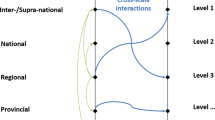Conclusion
The five areas of innovation found in the three case studies have brought actors together in new ways around water management strategies. We paid special attention to the role of participatory modeling, because it has been able to generate new policy options. For such complex and often deadlocked water management issues, new options are at a premium. The cases demonstrate that participatory modeling efforts are a key part of successfully addressing these major water management issues faced in the U.S. as well as elsewhere.
Similar content being viewed by others
References
Arrow, K., B. Bolin, R. Costanza, P. Dasgupta, C. Folke, C. S. Holling, B.-O. Jansson, S. Levin, K.-G. Maler, C. Perrings, and D. Pimentel. 1995. Economic growth, carrying capacity, and the environment. Science 268: 520–521.
CALFED. 2000. Programmatic Record of Decision. Sacramento, Calif.: CALFED.
Demchak, C. C. 1991. Military organizations, complex machines: Modernization in the U.S. armed services. Ithaca, N.Y.: Cornell University Press.
Light, S. S., L. H. Gunderson, and C. S. Holling. 1995. The Everglades: Evolution of management in a turbulent environment. In Barriers and bridges to the renewal of ecosystems and institutions, eds. L. H. Gunderson, C. S. Holling, and S. S. Light, 103–168. New York: Columbia University Press.
McConnaha, W. E. and P. Paquet. 1996. Adaptive strategies for the management of ecosystems: The Columbia River experience. American Fisheries Society Symposium 16: 410–421.
McLain, R. J. and R. G. Lee. 1996. Adaptive management: Promises and pitfalls. Environmental Management 20 (4): 437–448.
Ogden, J. C. 1999. Everglades-South Florida assessments. In Bioregional assessments: Science at the crossroads of management and policy, eds. K. N. Johnson, F. Swanson, M. Herring, and S. Greene. 169–185. Washington, D.C.: Island Press.
United States Army Corps of Engineers and South Florida Water Management District. 1999. Rescuing an endangered ecosystem: The plan to restore America’s Everglades. Jacksonville/West Palm Beach, Flor.: United States Army Corps of Engineers and South Florida Water Management District.
Van Eeten, M.J.G., and E.M. Roe. 2002. Ecology, Engineering and Management: Reconciling Ecosystem Rehabilitation and Service Reliability. Oxford: Oxford University Press.
Von Meier, A. 1999. Occupational cultures as a challenge to technological innovation. IEEE Transactions on Engineering Management 46 (1): 101–114.
Author information
Authors and Affiliations
Additional information
Recent publications include Ecology, Engineering and Management: Reconciling Ecosystem Rehabilitation and Service Reliability (with Emery Roe; Oxford: Oxford University Press). Current research interest include the reliability of critical infrastructures (such as electricity, water, telecommunications and the internet) and the development of methods to recast the intractable policy issues. Since 1999, he has been a Visiting Scholar at the University of California, Berkeley and Mills College, Oakland.
where he teaches and directs research in the application of economic theory and systems analysis methods to the solution of environmental and regional water resources problems. He has authored numerous articles and book chapters, served on various committees of the National Research Council of the National Academy of Sciences, and was a U.S. member of an advisory committee for the International Institute for Applied Systems Analysis (IIASA) in Laxenburg, Austria.
Emery Roe has published widely on science, technology and environmental controversies, including the debates over large technical systems, sustainable development, and ecosystem management. His books include Narrative Policy Analysis (Duke University Press, 1994), Taking Complexity Seriously: Policy Analysis, Triangulation and Sustainable Development (Kluwer, 1998), Except-Africa: Remaking Development, Rethinking Power (Transaction, 1999), and Ecology, Engineering and Management: Reconciling Ecosystem Rehabilitation and Service Reliability (with Michel van Eeten; Oxford: Oxford University Press).
Rights and permissions
About this article
Cite this article
van Eeten, M.J.G., Loucks, D.P. & Roe, E. Bringing actors together around large-scale water systems: Participatory modeling and other innovations. Know Techn Pol 14, 94–108 (2002). https://doi.org/10.1007/s12130-002-1017-x
Issue Date:
DOI: https://doi.org/10.1007/s12130-002-1017-x




